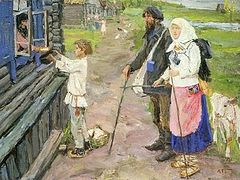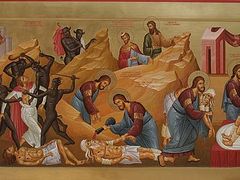 The distribution of bread among hungry children by Priest Moderatov. 1891-1892. The Lukoyan district, the Protasovo village. Photo by M.D. Dmitriev. 1892
The distribution of bread among hungry children by Priest Moderatov. 1891-1892. The Lukoyan district, the Protasovo village. Photo by M.D. Dmitriev. 1892 The society of Stiva Oblonsky, Countess Nordstone, Betsy Tverskoy, Alexei Vronsky and other characters of Leo Tolstoy’s immortal novel Anna Karenina, which seemingly lost its national self-awareness, in fact did not completely lose the ability of being self-critical, or the concept of right and wrong.
The Russian people have always shunned “glamorous”, ostentatious charity activities. This did not become possible until the aristocracy was completely misled by the new Western trends and influences. The state of the public mind of the age was brilliantly illustrated in the novel Anna Karenina.
But is lending a helping hand to the needy bad? No, it’s not bad. This is what Christians are supposed to do and it is in the spirit of the civilized Europe…
But was there any alternative to “high-society philanthropy” in Russia? And the answer is yes.
Among the publications of the famous Russian Archive magazine that was published by the outstanding specialist in the study of early texts Peter Bartenev (1829-1912)1 were articles by one provincial female landowner with the lovely penname, “Old Lady from the Steppe”.
“You can find special women in Russian villages!” the great Russian poet Nikolai Nekrasov (1821-1877) wrote with admiration. We absolutely agree with the classic. There have always been such women in Russia, and not only among the peasantry.
Let us remember the names of Ulyana Ustinovna Osoryina, who through her care and effective management made neighboring volosts [small rural districts in pre-revolutionary Russia] wealthy and saved whole villages from starvation; Natalia Sergeevna Balk, who moved from Moscow to Irkutsk and gave treatment to the local population on voluntary basis as a true unmercenary; Sofia Vladimirovna Panina, who founded the “Mutual Aid Bank”, and a host of other self-sacrificing women.
But let us return to the anonymous old landlady from the steppe. Like her older friend, the poetess Evdokiya (Eudocia) Petrovna Rostopchina (1811-1858), she called a spade a spade in the press and told the bald truth to everyone without paying attention to rank and social position, compelling the powers that be to publicly apologize.
 A public canteen “of communal dining”. 1891-1892. The Bolshoy Murom village, the Nizhny Novgorod province, the Knyagininsky district
A public canteen “of communal dining”. 1891-1892. The Bolshoy Murom village, the Nizhny Novgorod province, the Knyagininsky district One of the memories of the “old lady”, who wielded a formidable pen, was concerned with the care of the indigent. The author defended her contemporaries against the accusations that the care of the weakest members of society during her youth was allegedly “undeveloped”. The author ranked “charitable giving” as a kind of secular entertainment, like assemblies or balls, where a noble lady who wore the same dress for the second time could hear from wiseacre the following remark: “Your dress is not fresh any more.” She drew the readers’ attention to the fact that while “charitable activities” were widespread, financial ruin, avoidance of debts, and suicide rates did not drop. The “steppe writer” contrasted this kinds of secular entertainment, which were derived from the West, with charity and hospitality which have always been inherent in the Russian people.
Once Emperor Paul I said, “I have the same number of policemeisters as lords of manors.” If the monarch had replaced the word “policemeisters” with “philanthropists”, he would not have sinned against the truth.
The author recalled the famine of 1839-1841, when no peasants from the neighboring village that belonged to another landowner went hungry. “Almost all the local lords of manors preferred to suffer privations and felt it their duty to provide for their own peasants. And these peasants… would share some amount of the bread they received from their masters with the poor peasants from neighboring villages, whose landlords did not see fit to take care of their serfs,” the woman wrote.
She proceeded to mention the striking facts that today seem something quite out of the common run. She related that two prizhivalshchiks [“dependants”, in pre-revolutionary Russia this term referred to individuals who lived in mansions of rich people out of charity as permanent guests and did not have duties] lived in her family, and everybody, including servants and children, treated them as guests of honor and never asked them how long they had been enjoying their hospitality.
The author related that one of those guests was an imbecile (in the sense of a person with very low intelligence). “He would open his mouth only for eating… He would have tea, dinner and supper at the family table… He would spend summers on the stone bridge over the Moscow River where, standing at the railing, he watched the water flow under the bridge...” The narrator’s father took a former subordinate from his duty station (who had been discharged as medically unfit) into their home. He spent the rest of his life with this family in their mansion and was never oppressed by any of them.
Another guest who enjoyed the “steppe landowners’” hospitality was an elderly colonel who had once served as a guard of Emperor Paul I. The old man was in a very distressed state of mind up to his death, because he had allowed the guard to be relieved that fateful night when the regicides triumphed [the emperor was assassinated on the night of March 23, 1801]. Since the colonel was faithful to the murdered emperor, he was suddenly discharged soon after the regicide, and he obeyed without talking back to his superiors. From that moment everything in his life and career went wrong. Together with Africanus, a valet, and Zima, a coachman, the old colonel would spend winters as a “dependent” guest at the mansion-house of the narrator’s father for several years until his death.
Letting out that in addition to the abovementioned “permanent guests” their family had a custom of giving temporary shelter to dowerless, orphan girls until a suitable match was found for them, the author stressed that all these acts were regarded by their milieu as nothing but mere hospitality and were a widespread phenomenon among both well-to-do and second-rate landowners. Thus, once a man with forty servants and horses came to one of her father’s friends and lived in his mansion for forty years until his death. Another example: Count S.G. Stroganov [1794-1882; a prominent Russian statesman, philanthropist, archeologist, art historian, and collector, who contributed to the development of education, archeology, and arts in Russia; one of the country’s wealthiest landowners] would secretly give away over 200,000 rubles per year for grants and other regular acts of charity.
We have no more to add to the words of this generous “old lady from the steppe”. But (I don’t know whether aptly or inaptly) I cannot help but recall the short story, “Military Eloquence”, by Nicholai Leskov. In it an inspector-general gives his colonel a good scolding for a disorganized and disorderly condition:
“You are talking nonsense! Why is it that all of you pass the buck to each other?! A regimental commander must be responsible for everything! What are you up to? A regimental commander passes the buck to the squadron commanders! These will pass it on to the platoon commanders! They, in their turn, will pass it on to the cavalry sergeant majors! And these will pass it on to the soldiers… And soldiers will pass it on to God Almighty! And the Lord will say: ‘You are lying, vile creatures! I am not a groom to exercise your horses! Do it yourselves!’”
Among those who heard this explosion was one squealer that saw sedition in the reference to God. He hurried towards the bishop with the complaint, but the latter unexpectedly got all excited, seized the squealer’s hand and said:
“Excellent, excellent! It’s a pity that we have fewer orators in the Church than in the army. Why can’t we comment on the verse from the Gospel, Give to him that asketh thee (Mt. 5:42) like that: You, skinflint, don’t say to those in need ‘God will provide.’ God is not your Steward! So dispense alms yourself!... Believe me, it would have a much greater effect than some rhetorical balderdash.”






